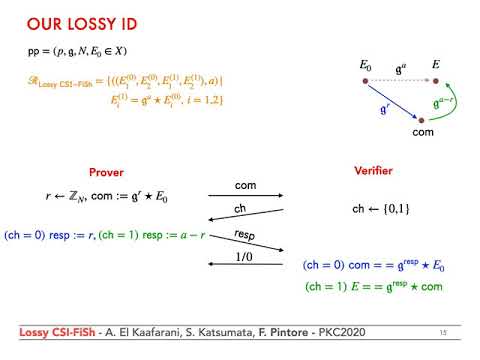CryptoDB
Lossy CSI-FiSh: Efficient Signature Scheme with Tight Reduction to Decisional CSIDH-512
| Authors: | |
|---|---|
| Download: | |
| Abstract: | Recently, Beullens, Kleinjung, and Vercauteren (Asiacrypt’19) provided the first practical isogeny-based digital signature, obtained from the Fiat-Shamir (FS) paradigm. They worked with the CSIDH-512 parameters and passed through a new record class group computation. However, as with all standard FS signatures, the security proof is highly non-tight and the concrete parameters are set under the heuristic that the only way to attack the scheme is by finding collisions for a hash function. In this paper, we propose an FS-style signature scheme, called Lossy CSI-FiSh, constructed using the CSIDH-512 parameters and with a security proof based on the “Lossy Keys” technique introduced by Kiltz, Lyubashevsky and Schaffner (Eurocrypt’18). Lossy CSI-FiSh is provably secure under the same assumption which underlies the security of the key exchange protocol CSIDH (Castryck et al. (Asiacrypt’18)) and is almost as efficient as CSI-FiSh. For instance, aiming for small signature size, our scheme is expected to take around $$approx 800$$ ms to sign/verify while producing signatures of size $$approx 280$$ bytes. This is only twice slower than CSI-FiSh while having similar signature size for the same parameter set. As an additional benefit, our scheme is by construction secure both in the classical and quantum random oracle model. |
Video from PKC 2020
BibTeX
@article{pkc-2020-30308,
title={Lossy CSI-FiSh: Efficient Signature Scheme with Tight Reduction to Decisional CSIDH-512},
booktitle={Public-Key Cryptography – PKC 2020},
series={Public-Key Cryptography – PKC 2020},
publisher={Springer},
volume={12111},
pages={157-186},
doi={10.1007/978-3-030-45388-6_6},
author={Ali El Kaafarani and Shuichi Katsumata and Federico Pintore},
year=2020
}

